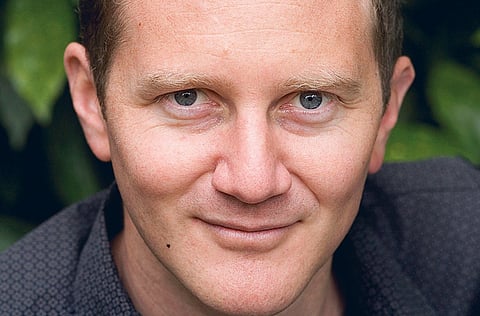Engaged with global issues
War and poverty preoccupy Chris Cleave and his works centre on them

From a shed in his back garden, built completely by himself, 36-year-old British author Chris Cleave created two masterpieces. "I'm a much better writer than I am a builder," Cleave jokes from his home in the suburbs of Kingston, Surrey, in a telephone interview with the Weekend Review.
Either the shed is suffocatingly warm with the heaters on or there is the option of opening the windows and freezing in the cold. This, he said, makes you think hard about why you want to be a writer.
Cleave's two novels, Incendiary and The Other Hand, have met with wide critical acclaim. Incendiary went on to be made into a film starring Michelle Williams and Ewan McGregor, while The Other Hand (published as Little Bee in the United States) is being made into a BBC screenplay, in association with Nicole Kidman's company.
If there is one thing to say about Cleave's writing, it is harrowingly shocking and not in a bad way. The situations he describes, his characters, his dialogue and the bare facts of his plots make for a gripping read. Cleave, who is married and has three children, is also a columnist for The Guardian.
The effect of politics
Incendiary and The Other Hand have one thing in common — they focus on relevant political issues, both local and international, and how they affect the United Kingdom. Rather than being an attack on the social system in Britain, Cleave says, they are an "attack on complacency".
"They are global stories, which happened to take place in the UK. This is the place I know," he says.
Cleave's first book, Incendiary, follows the story of a working-class mother and her struggle with grief after a bomb kills her husband and young son. The book is in the form of letters, written by the mother to Osama Bin Laden. This particular narrative technique is effective in making the book extremely poignant. It shows how the war on terror is such a demented concept, Cleave says, which should be examined from a human point of view, rather than an ideological one.
Another problem facing the world, Cleave feels, is poverty. Five billion people in the world are effectively poor, while one billion are effectively rich, which is the "effect of globalisation".
"The war on terror and the problem of poverty are global stories played out in a microcosm in London. And not just in London but in individual lives in London. My books have a small stage, in the minds of small people, on what really is a small island [the UK]."
Cleave's second work, The Other Hand, follows a young Nigerian girl who escapes from the massacre of her entire village, later managing to escape from an immigration detention centre in England.
According to the UK Immigration and Asylum Act 1999, "‘detention centre' means a place which is used solely for the detention of detained persons but which is not a short-term holding facility, a prison or part of a prison". However, the immigration issue in the UK has grown significantly over the last decade, with detention centres coming under scrutiny as becoming too similar to prisons for people who have not committed any crime. Cleave had first-hand experience of a UK detention centre while doing casual labour there one summer during his student days. Working in the centre's canteen, serving food to asylum seekers, Cleave says: "It was the first time I realised that there are imprisoned people who have done nothing wrong. They haven't broken the law. I was blown away by it."
Since then, Cleave has been researching the problem of asylum seekers in the UK, investigating the system and speaking to seekers themselves. "We compound the crime that's already committed against [people who flee from horror] in the countries they're fleeing from. I will fight till that's changed," he says.
The world's poor
The problem is becoming worse, he says, and it is the biggest story on Earth because it is exactly the story of billions of poor people in the world, looking at the rich people and saying, "Please, will you share?"
"We've said, ‘No, we won't,' and that plays out every day in what happens to asylum seekers. I would have been a coward if I hadn't written the book because it bothers me about the way we live," he notes.
So what is next for the talented writer? Cleave is working on a book looking at the how champion sportspeople tell the stories of their lives. "It's life versus death and good versus evil: Good is just making an effort, while evil is complacency and doing nothing," he said.
War (particularly in Iraq and Afghanistan) is also a topic of interest for the writer. The book will be about justifications for war and how people allow others to tell them what is right and wrong, rather than standing up for their beliefs themselves. "It won't be about the British government taking us to war but the British people allowing us to do it. We like to blame our government but we don't like to stand up to it," he says.
Cleave cares about the books he writes and is ultimately trying to write about the fact that "people are strong and can make a difference". He jokes: "Ultimately it is just one man in a shed writing stories."
Chris Cleave is a guest at the ongoing Emirates Airline International Festival of Literature (EAIFL) at the Dubai Festival City.


